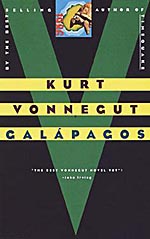
![]() llLeoll
llLeoll
3/18/2013
![]()
This novel was a typical Vonnegut. Funny in whimsical yet cynical way.
In Galapagos, Vonnegut tells the story of how a small group of castaways on the Galapagos islands, made famous by Darwin's voyage on the Beagle. He tells us how their big brains landed them there. And how they became the sole human survivors in the world.
In a style similar to Breakfast of Champions, Vonnegut focuses quite humorously on a biological explanation for humanity's evil acts: Our big brains. Our brains, which are never satisfied, and lead us astray by trying to protect our self image. Be it as a sea faring captain, whose pride would not allow him to confess that he did not know how to navigate without electronic instruments. To the people who build bombs. So we can kill more efficiently. To protect our self image in case another nation decides to attack us. With similar weapons designed by their big brains.
As always with Vonnegut, the delivery is wry. And his narrator, a ghost, the son of his infamous anti-hero, the cranky science fiction writer Kilgore Trout. The ghost was decapitated by a sheet of steel while working as a welder in Sweden while making the boat, and thus haunted its decks. Trying to figure out humanity.
Along the way, Vonnegut casts a sad, critical eye on humanity. our penchant for war. Our penchant to traffic in child slavery. Our silly and inane economic system, that places money and promotion ahead of "people."
We are, it seems, enslaving ourselves.
While not as funny as some of his other books -- Cats Cradle and Slaughterhouse Five remain my favorite Vonnegut books -- this one is at least as funny as Breakfast of Champions. in fact, it seems cut out of the same cloth as Breakfast, without the humorously childish drawings that made that book so captivating.
Overall, highly recommended work. By a postmodernist master. That can be read quickly, since Vonnegut uses deceptively simple language. To draw novels that ask the deepest questions a human can ask. Like "what are we so rotten to each other?"
Leo Walsh is a writer, who splits his time between California and Cleveland, Ohio. Catch him at leo-walsh.com.